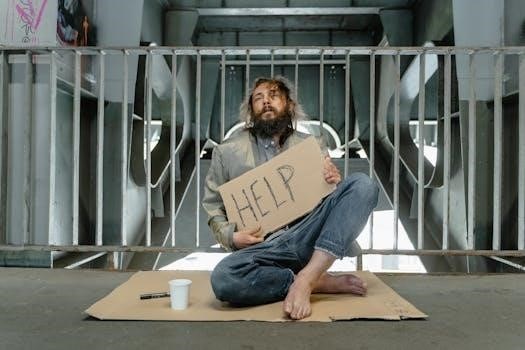Overview of “Poor Economics”
Poor Economics, penned by Abhijit V. Banerjee and Esther Duflo, presents a radical rethinking of global poverty. The book challenges conventional wisdom and explores the complexities of living in poverty through rigorous research and insightful analysis.

Authors⁚ Abhijit V. Banerjee and Esther Duflo
Abhijit V. Banerjee and Esther Duflo, both esteemed professors of Economics at the Massachusetts Institute of Technology (MIT), are the brilliant minds behind Poor Economics. Their extensive research, spanning over fifteen years and encompassing various developing countries, forms the bedrock of the book’s insightful analysis and innovative solutions. Both Banerjee and Duflo are not only academics but also Nobel laureates, having been awarded the Nobel Memorial Prize in Economic Sciences for their experimental approach to alleviating global poverty. Their work challenges common assumptions about economics and offers a nuanced understanding of the daily decisions facing the world’s poorest individuals. Through their meticulous research and practical vision, Banerjee and Duflo have provided a vital guide for policymakers, philanthropists, activists, and anyone committed to building a world without poverty, solidifying their place as leading figures in development economics.
Key Concepts in “Poor Economics”
Poor Economics delves into the nature of poverty, challenging misconceptions and examining the daily decisions of those living with limited resources. It provides a nuanced understanding of the complexities faced by the world’s poorest.
Understanding the Nature of Poverty
In Poor Economics, Banerjee and Duflo emphasize the importance of truly understanding the multifaceted nature of poverty. They move beyond simplistic assumptions, delving into the specific challenges and constraints that shape the lives of individuals living on less than 99 cents a day. The authors explore why the poor borrow to save and why they might miss out on free life-saving immunizations but spend money on unnecessary drugs. They demonstrate that poverty is not simply a lack of money but a complex web of interconnected issues. This book offers insights into the daily realities and counterintuitive choices faced by the world’s poorest people, highlighting the need for nuanced and context-specific solutions to alleviate poverty effectively.
Challenging Misconceptions About Poverty
Poor Economics actively challenges common misconceptions about poverty, urging readers to abandon the habit of reducing the poor to caricatures. Banerjee and Duflo dismantle simplistic narratives by presenting evidence-based research from various developing countries. They address assumptions about laziness, lack of motivation, and irrational decision-making, revealing the complex realities that drive the choices of those living in poverty. The book demonstrates that the poor often make rational decisions within the limited options available to them. By dispelling these myths, the authors pave the way for a more nuanced and effective approach to poverty alleviation. This radical rethinking encourages policymakers, philanthropists, and activists to move beyond stereotypes and engage with the real challenges faced by the world’s poorest individuals.
Daily Decisions of the Poor
Poor Economics delves into the daily decisions of individuals living in poverty, providing insights into the complex trade-offs they face. The book explores why the poor might borrow to save, miss out on free life-saving immunizations, but pay for unnecessary drugs. Banerjee and Duflo reveal how limited resources, lack of information, and psychological biases influence these choices. They examine how the poor manage their finances, health, and education, often in environments characterized by uncertainty and risk. By understanding these daily struggles, the authors highlight the importance of designing policies and interventions that are tailored to the specific needs and constraints of the poor. Poor Economics demonstrates that creating a world without poverty begins with understanding the daily decisions facing the poor and addressing the underlying factors that shape their lives.

Methodology and Research
Banerjee and Duflo’s Poor Economics relies on extensive field research in developing countries. They pioneered the use of randomized controlled trials to rigorously evaluate the impact of poverty alleviation interventions.
Field Research in Developing Countries
The foundation of Poor Economics is built upon years of extensive field research conducted by Abhijit V. Banerjee and Esther Duflo in diverse developing countries. Spanning across five continents, their work involved immersing themselves in the daily lives of the poor to gain a nuanced understanding of their challenges and decisions.
This immersive approach allowed them to move beyond theoretical assumptions and directly observe the realities of poverty. By living and interacting with the communities they studied, Banerjee and Duflo were able to identify specific problems and test potential solutions in real-world settings. Their dedication to fieldwork provided invaluable insights that shaped the core arguments of Poor Economics.
Randomized Controlled Trials
A cornerstone of the methodology employed in Poor Economics is the use of randomized controlled trials (RCTs). Banerjee and Duflo pioneered the application of RCTs to development economics, adapting a technique commonly used in medicine to evaluate the effectiveness of social programs. This approach involves randomly assigning individuals or communities to either a treatment group or a control group.
The treatment group receives the intervention being tested, while the control group does not. By comparing the outcomes of the two groups, researchers can isolate the impact of the intervention. RCTs provide rigorous evidence on what works in poverty alleviation, allowing for data-driven policy decisions and more effective resource allocation, ensuring robust and reliable results.
Core Themes and Arguments
At its core, Poor Economics advocates for rethinking global poverty by understanding the daily decisions of the poor. It also champions innovative, evidence-based approaches to poverty alleviation through rigorous research methods and data-driven strategies.
Rethinking Global Poverty
Poor Economics challenges the habit of reducing the poor to caricatures, instead urging a deeper understanding of the specific problems that accompany poverty. Banerjee and Duflo encourage us to abandon common assumptions about fighting global poverty, highlighting the nuanced realities of those living on less than 99 cents a day. The book seeks to provide a nuanced understanding of the complexities faced by the world’s poorest individuals.
It emphasizes the importance of understanding the daily decisions of the poor, such as why they borrow to save or miss free immunizations while paying for unnecessary drugs. This involves looking at the economic lives of those living on less than $2 per day and questioning why the enterprises of the poor often seem more like buying a job than entrepreneurship.
Innovative Approaches to Poverty Alleviation
Poor Economics champions innovative approaches to poverty alleviation rooted in rigorous research. Banerjee and Duflo’s work emphasizes the use of randomized controlled trials (RCTs) in development economics to identify proven solutions. These methods help in understanding what truly works in development, moving beyond assumptions to evidence-based strategies.
The book highlights the transformative potential of meticulous work in offering solutions for poor people anywhere. It serves as a vital guide to policy makers, philanthropists, and activists focused on building a world without poverty. The Poverty Action Lab at MIT supports work based on these principles, ensuring that innovative ideas are tested and implemented effectively.

Impact and Recognition
Poor Economics garnered significant impact and recognition, including the Nobel Prize in Economic Sciences for Banerjee and Duflo. The book also won the Financial Times and Goldman Sachs Business Book of the Year Award.
Nobel Prize in Economic Sciences
Abhijit V. Banerjee and Esther Duflo, the authors of Poor Economics, were jointly awarded the 2019 Sveriges Riksbank Prize in Economic Sciences in Memory of Alfred Nobel, along with Michael Kremer. This prestigious award recognized their experimental approach to alleviating global poverty. Their work, as showcased in Poor Economics, highlighted the importance of understanding the daily decisions of the poor and challenging common misconceptions about poverty. The Nobel committee lauded their use of randomized controlled trials to identify effective interventions. Their findings have had a transformative impact on development economics and global poverty reduction strategies, influencing policy makers, philanthropists, and activists worldwide by providing a vital guide to building a world without poverty.
Business Book of the Year Award
Poor Economics⁚ A Radical Rethinking of the Way to Fight Global Poverty received significant recognition beyond academic circles, winning the prestigious Financial Times and Goldman Sachs Business Book of the Year Award in 2011. This award acknowledged the book’s accessibility and relevance to a broader audience interested in understanding and addressing global poverty. The book’s innovative approach, combining rigorous research with compelling storytelling, resonated with business leaders, policymakers, and the general public alike. The award highlighted the book’s contribution to shifting the conversation around poverty alleviation, emphasizing the importance of evidence-based solutions and challenging conventional assumptions. The book offered transformative potential for poor people anywhere, and is a vital guide to policy makers, philanthropists, activists.

Relevance for Policy and Practice
Poor Economics provides invaluable insights for policy formulation. Its findings and methodologies offer practical guidance for designing effective anti-poverty programs, grounded in real-world evidence and a nuanced understanding of the challenges faced by the poor.
Guide for Policy Makers
Poor Economics serves as a critical guide for policymakers. It equips them with evidence-based strategies to effectively combat global poverty. By understanding the intricacies of poverty, policymakers can craft informed policies. These targeted interventions address the specific challenges the poor face. The book’s emphasis on randomized controlled trials provides a framework. This framework will allow for evaluating the impact of interventions. Policymakers will gain the ability to ensure resources are used efficiently. Banerjee and Duflo’s work highlights the importance of focusing on practical, actionable solutions. It also emphasizes the need to move beyond broad generalizations about poverty. Ultimately, the book empowers policymakers to create meaningful change in the lives of the world’s poorest populations through informed and effective strategies.
Implications for Philanthropy and Activism
Poor Economics profoundly shapes philanthropy and activism related to poverty alleviation. The book encourages a shift towards evidence-based approaches. It urges philanthropists and activists to critically evaluate the impact of their initiatives. Banerjee and Duflo advocate for rigorous testing and analysis. This helps ensure that resources are allocated to programs that truly work. The book highlights the complexities of poverty. This encourages a more nuanced understanding of the challenges faced by the world’s poorest populations. It inspires innovative solutions and targeted interventions. The authors emphasize the importance of focusing on specific problems. It also encourages avoiding broad assumptions. This book empowers philanthropists and activists to make a greater impact by adopting a more strategic and effective approach to their work, informed by careful research and experimentation. It is a call to action for thoughtful and impactful engagement.
